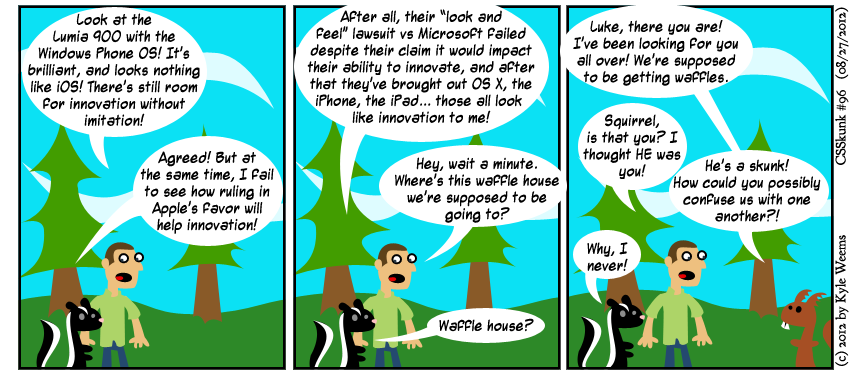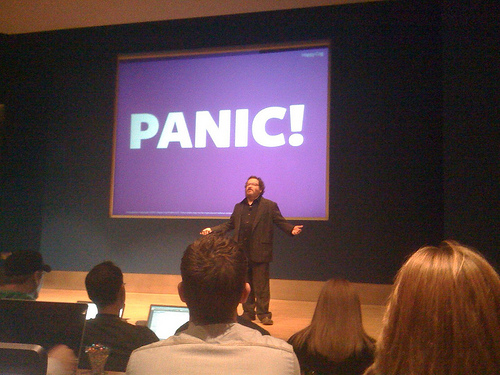Squirrel vs Skunk
Monday, August 27th, 2012
Mobile development superstar Luke Wroblewski (whom lucky attendees of AEA: Chicago will be hearing speak on mobile design later today) stars in today’s comic along with… CSSkunk? How could Luke mistake him for the Squirrel? Is he really copying so much of his “trade dress” that someone would mistake them for one another?
By now virtually anyone moderately connected to the tech world has heard of the verdict in the Apple vs Samsung trial, with Samsung losing out to the tune of $1.049 billion dollars.
I think it’s fairly apparent that Samsung was least somewhat in the wrong, with a solid trail pointing towards willful infringement on their part. Despite this, I also believe that by letting this trial come to a verdict (instead of being settled out of court), both Apple and Samsung have actively aided in continuing to back the travesty that is our current patent system and through doing so are perpetuating harm on the future of technological innovation.
I also feel that the verdict reached seems over-reaching and filled with errors. After reading of some interviews with the jurors and some breakdowns of the verdict I go the feeling it was off. Then I saw this post by Groklaw, which goes over it in much more detail.
Luke seems to hold the opposite position about the verdict and it’s appropriateness, as shown by a series of tweets starting with this one: “Companies better rethink ‘best practices review’ as a way of doing design in light of today’s ruling.” In one tweet he points out the Lumia 900, which runs Microsoft’s Windows Phone, as a great deal of unique innovation, and appears to indicate that Samsung’s infringing devices lack innovation and therefore merit.
I’m not sure I buy that line. Like in nature, most changes in technology are evolutionary, not revolutionary, building upon what comes before incrementally. Part of my biggest personal objection with modern patent law is how aggressively it seems to disrupt that process, forcing competitors to go out of their way to radically create something new instead of building on what came before.
Call me crazy, but if all of these companies are counter-suing the hell out of each other constantly over violations of one another’s patents, then something is seriously amok here. I would say that many of the patents that are being granted are too fundamental in their nature, representing obvious interactions and form-factors that are common sense solutions to the problems facing a given technology. If each mobile company is stealing from one another, when they’re each aware of the legal risk involved, then is it possible that there are problems that innovation alone cannot resolve, creating a situation where patents are restricting unnecessary processes that are required by any device in the market merely to be functional?
A good piece discussing the lawsuit and the issues it represents is “Who Cares If Samsung Copied Apple” by James Allworth, which I saw via a link on Bruce Lawson’s reading list of the day.
The article was written prior to the verdict but remains relevant after as it directly speaks to the issue I see here. In particular I like the last two paragraphs, which go as follows:
If Apple ends up winning this case against Samsung - and either stops Samsung from releasing their phones and tablets to the market, or charges them a hefty license fee to do so - does anyone really believe that the market will suddenly become more innovative, or that devices will suddenly become more affordable? Similarly, if Samsung wins, do you really believe that Apple will suddenly slow its aggressive development of the iPhone and iPad? It’s certainly not what happened last time they lost one of these cases.
Now, if you’re with me so far, then I don’t think it’s a leap to suggest that having these companies duke it out in court over “who might have copied who” is counterproductive. All these lawsuits flying around suggest that everyone is already copying each other, anyway. A better solution? Let’s have these companies solely focused on duking it out in the marketplace - where consumers, not courtrooms, make the decisions about innovation. In such a world, the best defense against copying isn’t lawsuits, but rather, to innovate at such a rate that your competition can’t copy you fast enough. That, to me, sounds like an ideal situation not just for consumers - but for the real innovators, too.
Matt Drance at Apple Outsider also wrote a piece prior to the verdict, “The Trial” which follows much of the same vein. Here’s a good quote from the piece:
Most importantly, this case brings the ever-brewing controversy of software patents further into the spotlight. Apple’s case is far from patent trolling, but I do worry about the precedent it could set. If a verdict is reached, lawyers and judges across the country will surely look back to this case repeatedly during their own. In closing arguments, Apple attorney Harold McElhinny told the jury: “If you find for Apple in this case, you will have re-affirmed the American patent system.”
I don’t know if I’m correct with my view that these sorts of trials, regardless of who wins, are harming us the consumers in the long run. Maybe I’m just cynical. But I know that these corporations don’t hold us in their best interest. They exist to extract money from us, and the only reason they’re using our court systems to wage their wars is to gain an advantage in collecting more of that money.
Using lawyers to stifle competition doesn’t sound to me like it’s going to make the next model of iPhone cheaper for me to purchase, nor will it somehow create more options for me to choose from on the market. So if these trials aren’t benefiting us, what impact will it have?
I know a lot of people have a strong opinion on this topic. I’d like to hear them. If you took a moment to tell me why I’m right or wrong using one of the methods below, I’d be grateful.
